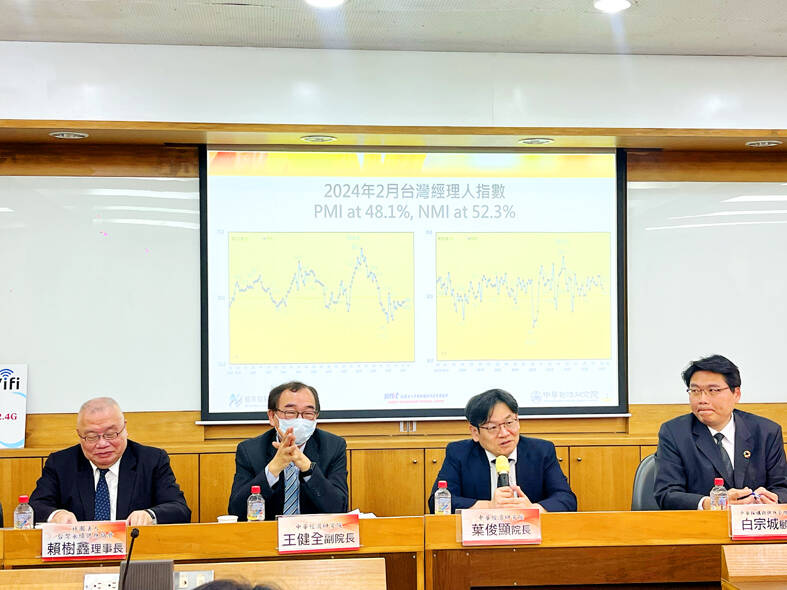Taiwan’s official manufacturing purchasing managers’ index (PMI) was 48.1 last month, virtually unchanged from January’s 48, as all sectors reported a decline in business mainly due to holiday disruptions, the Chung-Hua Institution for Economic Research (CIER, 中華經濟研究院) said yesterday.
However, firms were mostly confident about their business prospects, indicating that a rebound is around the corner, the institute said.
“The latest PMI showing is not bad given the significant drop in working days caused by the week-long Lunar New Year holiday in February,” CIER president Yeh Chun-hsien (葉俊顯) said.

Photo: Hsu Tzu-ling, Taipei Times
PMI data aim to gauge the health of the manufacturing industry, with scores of more than 50 indicating expansion and those lower than the threshold suggesting a contraction.
The barometer held steady, which was encouraging and had to do with expectations that business would pick up, Yeh said.
Order visibility might become clearer and boost purchasing activity from this month, he said.
Taiwan Semiconductor Manufacturing Co’s (台積電) recent opening of a wafer fab in Japan reflects an upturn in chip demand and would benefit the companies in its supply chain, he said.
At the same time, the six-month business outlook subindex gained 7.8 points to 54, returning to growth for the first time in 21 months, a sign that inventory adjustments for tech firms are close to ending, he said.
The surge in global demand for artificial intelligence (AI) is fueling local firms that supply AI severs, graphics processing units and other critical components, he added.
Holiday disruptions accounted for month-on-month declines in new orders, delivery time, employment, inventory and clients’ inventory, while industrial output and raw material prices increased, as firms prepared for improved business, the institute’s monthly report said.
The non-manufacturing index shed 1.2 points to 52.3 last month, because some sectors started to lose confidence as Taiwanese prefer to travel overseas and the number of inbound tourists is not growing fast enough, CIER said.
In particular, hotels and restaurants no longer held positive views about their business prospects due to the arrival of the low season and a high comparison base last year, it said.
However, financial institutions, property brokers and telecoms became optimistic, partly due to rallies on the TAIEX, it said.

Vincent Wei led fellow Singaporean farmers around an empty Malaysian plot, laying out plans for a greenhouse and rows of leafy vegetables. What he pitched was not just space for crops, but a lifeline for growers struggling to make ends meet in a city-state with high prices and little vacant land. The future agriculture hub is part of a joint special economic zone launched last year by the two neighbors, expected to cost US$123 million and produce 10,000 tonnes of fresh produce annually. It is attracting Singaporean farmers with promises of cheaper land, labor and energy just over the border.

US actor Matthew McConaughey has filed recordings of his image and voice with US patent authorities to protect them from unauthorized usage by artificial intelligence (AI) platforms, a representative said earlier this week. Several video clips and audio recordings were registered by the commercial arm of the Just Keep Livin’ Foundation, a non-profit created by the Oscar-winning actor and his wife, Camila, according to the US Patent and Trademark Office database. Many artists are increasingly concerned about the uncontrolled use of their image via generative AI since the rollout of ChatGPT and other AI-powered tools. Several US states have adopted

A proposed billionaires’ tax in California has ignited a political uproar in Silicon Valley, with tech titans threatening to leave the state while California Governor Gavin Newsom of the Democratic Party maneuvers to defeat a levy that he fears would lead to an exodus of wealth. A technology mecca, California has more billionaires than any other US state — a few hundred, by some estimates. About half its personal income tax revenue, a financial backbone in the nearly US$350 billion budget, comes from the top 1 percent of earners. A large healthcare union is attempting to place a proposal before

KEEPING UP: The acquisition of a cleanroom in Taiwan would enable Micron to increase production in a market where demand continues to outpace supply, a Micron official said Micron Technology Inc has signed a letter of intent to buy a fabrication site in Taiwan from Powerchip Semiconductor Manufacturing Corp (力積電) for US$1.8 billion to expand its production of memory chips. Micron would take control of the P5 site in Miaoli County’s Tongluo Township (銅鑼) and plans to ramp up DRAM production in phases after the transaction closes in the second quarter, the company said in a statement on Saturday. The acquisition includes an existing 12 inch fab cleanroom of 27,871m2 and would further position Micron to address growing global demand for memory solutions, the company said. Micron expects the transaction to